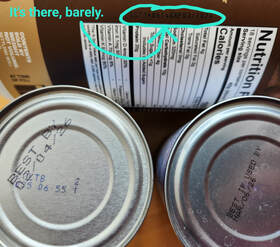 Years ago, one of my most humorous friends and I discussed food when the conversation turned to expiration dates. I do not recall what I said, but I clearly remember his response: “Judith, didn’t you know that expiration dates are for rich people?” His wit amused me as always, but I was also shocked by the concept that expiration dates could be at least somewhat irrelevant. I have witnessed the food expiration debate play out in more pantries than I can count. Some individuals discard all food as soon as the expiration date passes. I have also found canned goods that predate the birth of expiration dates and whose contents rattled when moved. Most clients fall somewhere in between. I err on the side of caution when making recommendations to clients, especially those who lack a strong sense of smell, vision, and taste or those who are immune compromised. Expiration Dates in the News This past week, the Wall Street Journal published an article about expiration dates. It is behind a paywall, so a brief synopsis and my impressions are below. The author, Josh Zumbrun, explains the birth of expiration dates and how the public has misunderstood their purpose. He writes, “The dates originated as a coded system for manufacturers to communicate to retailers when to rotate stock. Consumers clamored for information on the freshness of food, and in the 1970s and 1980s consumer-facing dates became widespread, though never standardized. Food manufacturers have tried, largely in vain, to explain that these are mostly general indicators of when food is at its peak quality. Most foods, properly stored, remain edible and safe long after their peak.” He goes on to explain how much food the US wastes. Expiration dates share some of the blame. The United Kingdom reduced food waste by altering its dating system entirely. The US seems to be catching up: “Since 2017, FMI” (Food Industry Association) “has encouraged members to coalesce around just two labels: “Best if used by,” which indicates the product might not taste quite as good after that date but is still safe, and “Use by” for those cases where the food might actually be unsafe, such as meat from the deli counter.” One expert suggests keeping refrigerators no higher than thirty-seven degrees. To this, I add learning where the coldest parts of your refrigerator are and planning accordingly. After an unfortunate mishap with an unlucky can of Diet Dr. Pepper, I can attest that soda cans do indeed violently rip open when left in the back of the refrigerator. Their icy contents burst in every direction, resulting in a Tarantino-esque mess that is an absolute joy to clean up. Take it from me, it is an event to avoid. Canned Goods and Non-Perishables Do Not Last Forever The USDA shares significant data regarding shelf-stable foods and canned goods. The section under “Will commercially canned foods last forever?” is particularly informative, as well as the “Shelf Stable Food Chart” towards the bottom of the page. Did you know that acidic foods will eventually leach into the container, affecting taste and lowering nutrition? Acidic canned goods last twelve to eighteen months, and low-acid foods last two to five years. Storing Canned Goods Toss cans that are rusty or exposed to temperatures above one hundred degrees. It is best to avoid storing food in non-climate-controlled areas of the home, such as garages. When working in kitchens, I inform clients of the hidden danger of storing food (even canned goods) in the same area as household cleansers. The chemicals can leach out over time, even if they do not leak. Botulism: Not Quite the Bargain We Hoped For My mother taught me that although dented cans sold at a reduced price seem like a good deal, they might not be the bargain we hoped for. Large dents, especially near the top or bottom, can compromise the seal. The same goes for rusty or bulging cans. Botulism thrives in anaerobic environments. Although rare, it can result in paralysis, so I would much rather waste a few dollars than my health. Toss a can if anything spurts out when opening it. Detecting Spoiled Food Certain foods like nuts and flour contain oils and fats that can become rancid over time. Sometimes, the off-smell is subtle, but once identified, it becomes easier to detect again in the future. I keep eggs past expiration since I eat them slowly. I have been using the egg water test to ensure that more “mature” eggs are still safe to consume. How to Avoid Food Waste The best way to avoid food waste is not necessarily to keep food around longer, but to staunch the flow on the front end. That is, curb the habit of purchasing unnecessary duplicates. Most of the food waste that I see results from duplicates long forgotten in backup locations outside the primary pantry and refrigerator. With these recommendations, you have enough knowledge to start tackling your pantries and refrigerators. You might start with condiments of questionable age that typically sit forlorn in refrigerator doors for far too long because it is so easy to forget them. If your sense of smell is lacking, enlist a friend or loved one whose sense of smell rivals that of a bloodhound. You will be amazed how much easier it is to find what you need when questionable food no longer gobbles up precious space in pantries and refrigerators.
0 Comments
Leave a Reply. |
Archives
March 2024
Categories
All
|
 RSS Feed
RSS Feed

